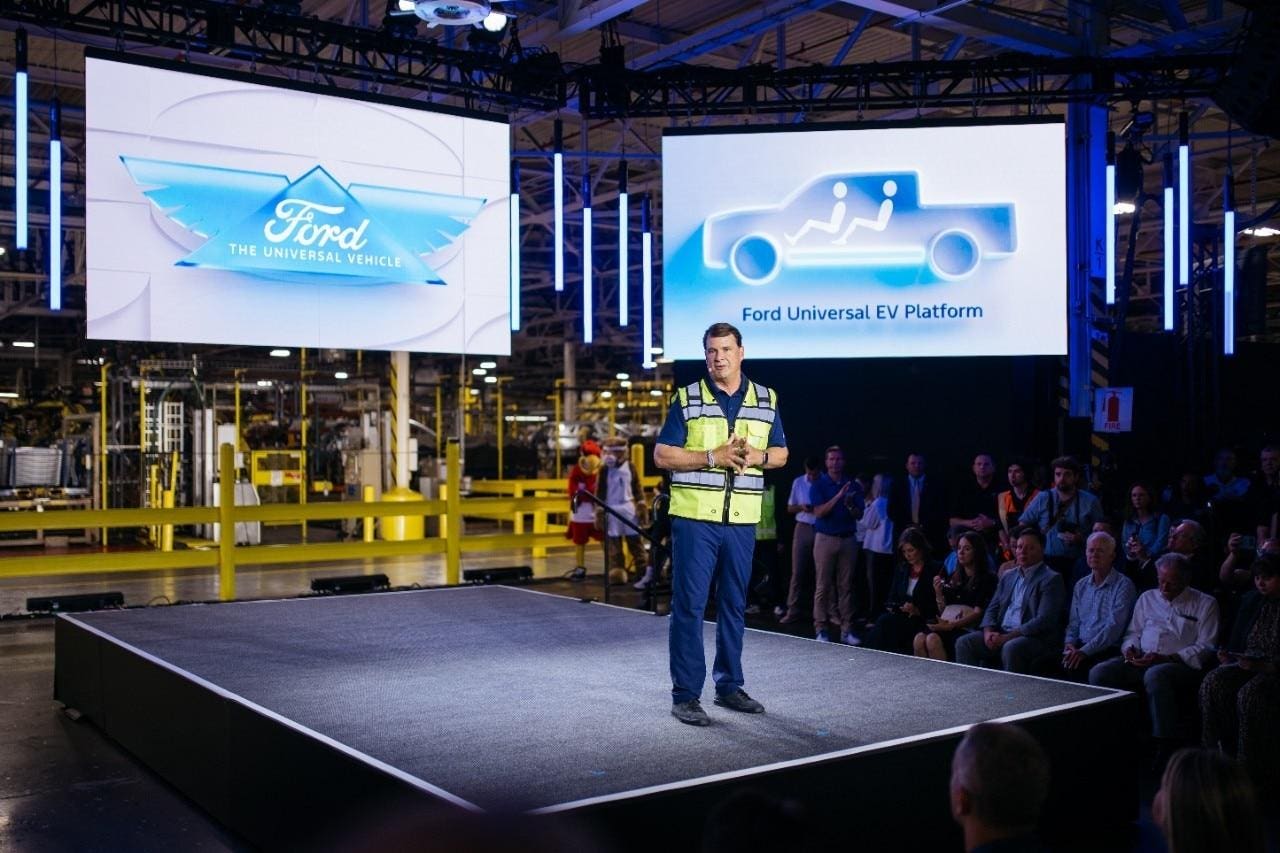Ford CEO Jim Farley talks about their universal EV platform
Ford
Ford promised their announcement of a new “universal” EV platform, along with a low-cost light pickup truck, would be another “Model T” moment in automaking history. Ford didn’t show us the truck, just teased various attributes, in particular that their electric truck should sell for about $30,000 and be available in 2027, thanks to new design and manufacuring innovations.
Nobody’s going to be critical of making a decent vehicle for a lower price, and Ford certainly knows the truck market, though they haven’t shown the same aplomb in the EV world. Based on what little we know, this is going to be a fairly short range truck, of low utility for towing traditional trailers. Are the choices the right ones?
Range
The base truck has a battery estimated at around 51kWh. The most efficient pickup today, Rivian’s, would get around 125 miles of range on that, with a practical range under 100 miles. That’s a customer scaring number, and impactical for road trips out of town, though many working trucks that never leave town could indeed get by on that. Perhaps Ford has found a way to make dramatic aerodynamic improvements–they did not show the shape of the truck–but even so, they will not likely get past 150 miles.
On the plus side, that’s with an LFP battery pack. LFP batteries are cheaper, used in shorter-range Teslas and many Chinese cars. While most of the battery industry has been on a very expensive quest for denser, longer range battery chemistries, “good old” LFP has been winning the day. While it’s a bit bulkier and heavier, it’s cheaper and you can charge it to 100% every day, which makes up a lot for the reduced range. Ford will make a longer range NMC version as well, according to reports.
Ford is perhaps betting that people will realize a not well understood truth, that long range is mostly useful for intercity road trips. (And in some cases, for those doing Level 1 charging at home.) While it’s a bit less convenient, customers who know they plan to use their truck around town can save a bunch of money buying a smaller battery. Ford presumably hopes the $30K price point will attract a whole new class of buyers.
Cost
Buyers who don’t understand EVs do indeed think they cost too much. The reality is that EVs are already a fair bit cheaper than ICE equivalents in total cost of ownership, when you add in energy and maintenance. Customers just have trouble feeling that–paying $5,000 more up front and saving $1,000/year is a huge win, but a delayed one. Of course, a vehicle that costs the same and still saves, $1,000/year is great, but that involves some compromises, like range.
It would be nice if there were a way to get around the psychology of this. A way to sell the car for less but get the owner to pay $500/month more for their electricity (but still less than they paid for gas) so they see themselves saving money every year, not just in the future. It could be that creative accounting is more valuable than good engineering, though both are great.
No sign as yet from Ford of another interesting solution for pickup trucks, namely a way to mount a temporary rental battery pack, or rental compact generator in the truckbed. That’s much easier to design into a truck than a car. If drivers could stop for 15 minutes at a depot on the way out of town to rent such a range extender, they could get the best of both worlds–a cheap in-town car, and the ability to get extra range on rarer trips out of town.
Single Platform
It’s not new to Ford, but they also plan to switch to a universal platform, on which they can build trucks, sedans, vans and SUVs. The battery pack of this pickup truck is a structural element that makes the bed of the truck. Universal platforms allow better economies of scale over all models, one of the best ways to drive down prices.
Where’s The Software?
Ford spoke a lot about new hardware designs and manufacturing approaches, which is great, but it’s 2025, and the vehicles that win will derive more and more of their value from their software, not their hardware. You need both, but without a world-beating software strategy, failure is likely. We didn’t hear a lot about this, so Ford had better start laying that out soon. It’s not just about making software-defined-vehicles; everybody knows about that, though they had to be dragged, kicking and screaming to do what silicon valley companies do as 2nd nature. It’s hard to imagine a new “Model-T moment” without a lot of innovation there.
Ford used to have a strong position overseas. It needs to regain that. In the USA, they will have protectionist tariffs to make them complacent, but out in the rest of the world they will be going head to head with China, where the things Ford announced today might generate a yawn, and not many Yuan. Let’s hope that real reinvention of the company is coming.









